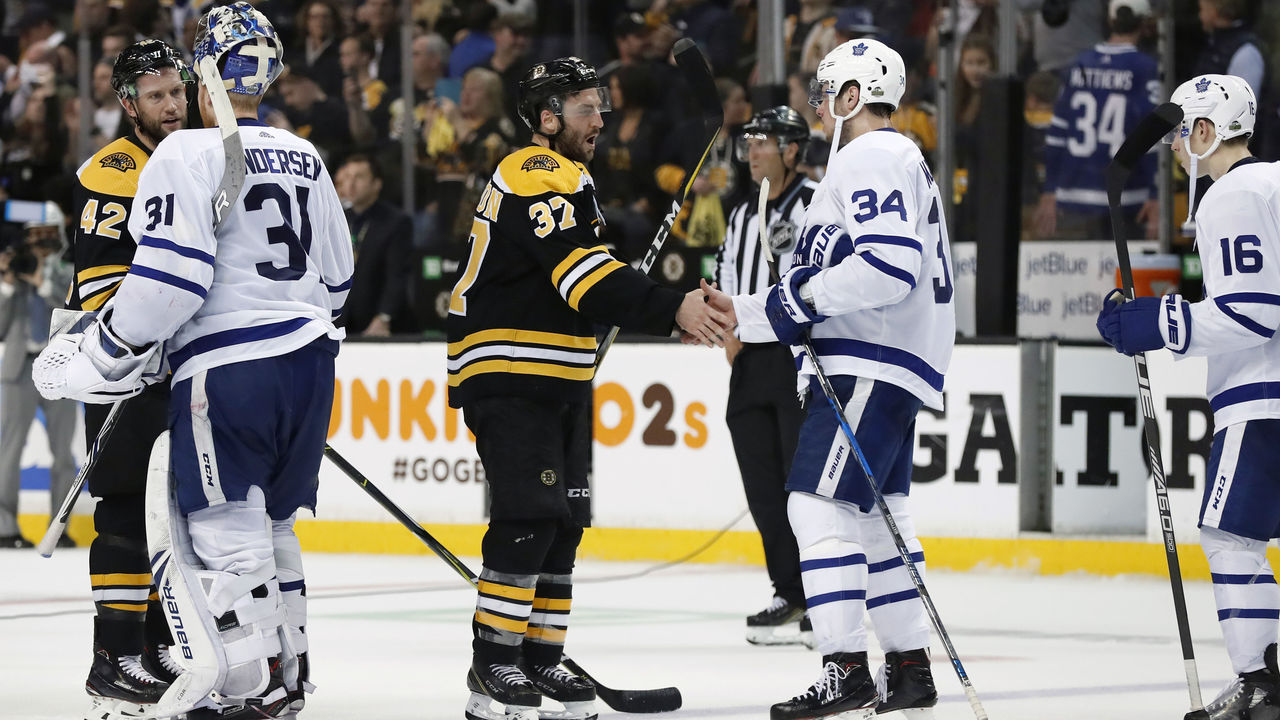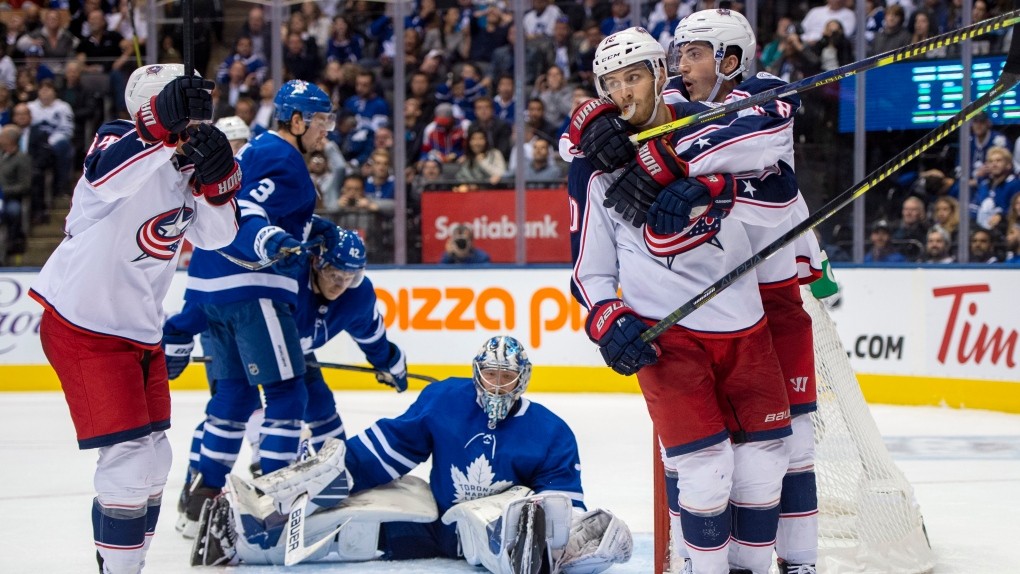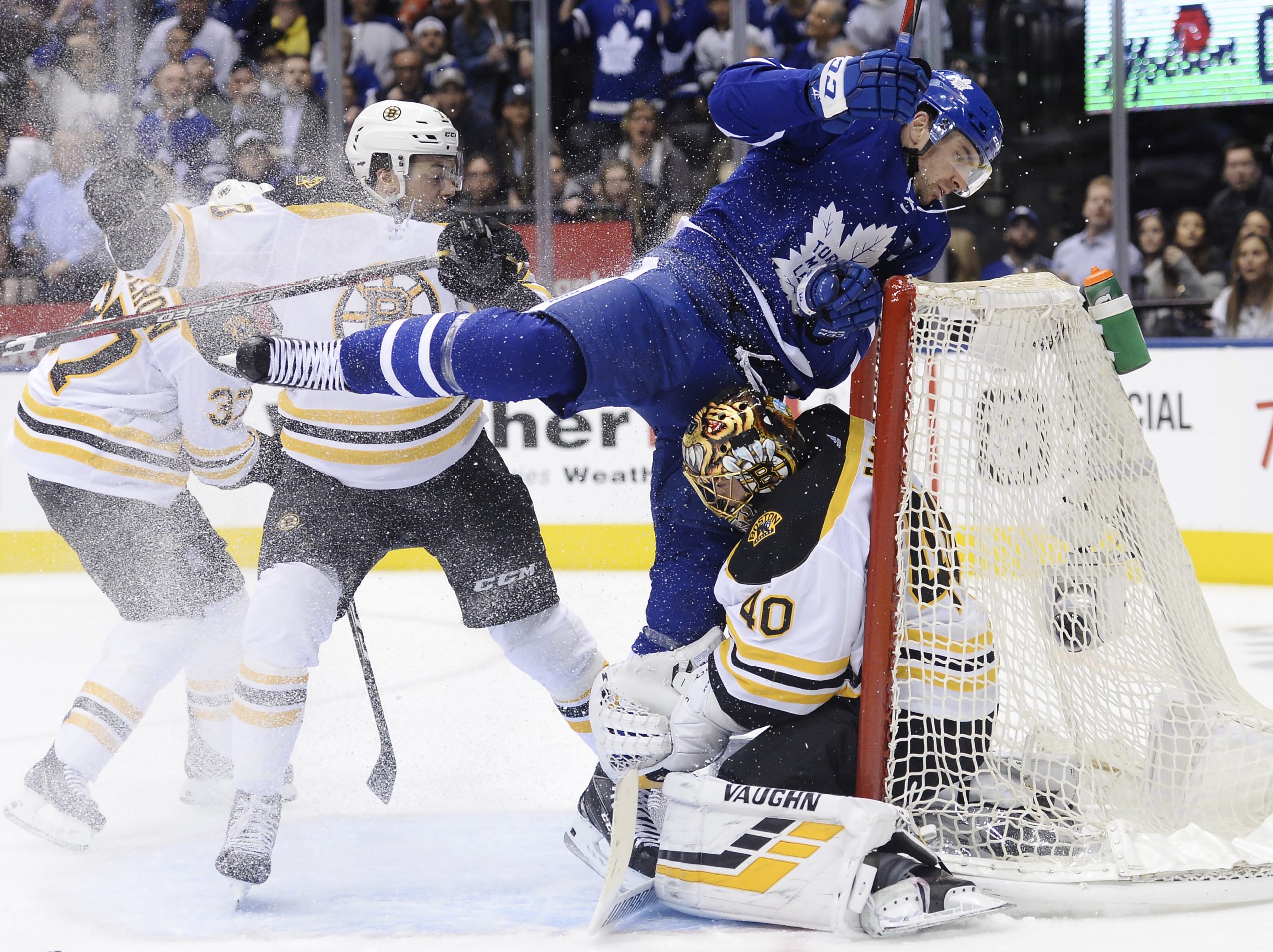It’s been a not-so-hot week for the Toronto Maple Leafs’ perceived toughness level.
On Friday night against San Jose, Auston Matthews took a high hit from Brenden Dillon without a reply from his teammates. The next night in Montreal, Tyson Barrie was dropped in almost the exact same spot on the ice via a big hit from Jeff Petry, who was punished with a menacing drive-by from Matthews.
Making matters worse in the past week — and the “softness” debate is a talking point right now because of this primarily — the Leafs have lost a couple of rivalry matchups on the road where the game got away from them in the third period without the team mounting much in the way of a pushback (note: both games were in back-to-back situations against rested clubs).
It’s been understandably frustrating to watch for many Toronto fans. Nothing drives Leafs fans nuts like watching their team lose both on the scoreboard and in the physical battle — to a couple of their Original Six divisional rivals, no less.
However, it’s a little premature to extrapolate what we’ve seen in the month of October, typically in back-to-back situations, from a team that doesn’t have John Tavares or Zach Hyman in the lineup currently, and assume this is evidence of a Leafs team that is too soft to ever go anywhere in the playoffs.
The 2019 Boston series and the Leafs’ heaviness

Revisionist history often taints the discussion surrounding the Leafs’ postseason loss to Boston last Spring. The defeat needs to be put in its proper context: It’s inaccurate to suggest that the Leafs were pushed around in the series.
It’s simply untrue. Almost as though a switch flipped after an uninspired final stretch to the regular season, the Leafs elevated their “compete level” throughout the series only to lose the seven-game battle on special teams, Game 7 goaltending, and bottom-six scoring. Toronto won the overall possession battle over the duration of the series to the tune of a 50.8 Corsi For percentage, a 51.5 Scoring Chances For percentage, and a 52.17 Expected Goals For percentage at 5v5.
In a playoff battle against an elite team like Boston, a team simply can’t do that unless it has, 1) maybe trailed for long periods in the majority of those games (which wasn’t the case here), or 2) competed and won its fair share of puck battles in order to generate ample zone time.
The Leafs were the better team at 5v5, held the lead three separate times in the series, and never trailed until the end of Game 7 against a Boston team that went all the way to the Finals, winning the Conference semis and Conference finals in six and four games, respectively. That wouldn’t have happened if the Leafs were getting shoved around and couldn’t hold their own in a physical battle.
For large parts of the series, the Bruins didn’t have an answer for the Leafs at even strength — if I’m honest, I was guilty of believing the Leafs had Boston dead and buried heading into Game 6. You really have to respect how the Bruins fought with their backs against the wall — there were clear signs of their championship-winning pedigree in those elimination games (the collective experience of Chara, Marchand, Bergeron, Krejci, Rask shined through).
Keep in mind that series was played with Nazem Kadri, the Leafs’ feistiest forward, suspended for all but the opening two games. Probably their most physical forward with Kadri out of the lineup was Zach Hyman, who engaged in post-whistle scrums and finished his checks hard consistently throughout the series, even towards the end despite a blown-out ACL.
From my vantage point, it looked like a young Leafs core that was coming of age and had taken a step in its playoff battle-readiness only to trip up against the league’s second-best regular-season (and ultimately playoff) team due to inferior special teams and Game 7 goaltending.
The inauspicious start to the 2019-20 season

Now take away Kadri, remove both Hyman and Tavares from the lineup temporarily — the Leafs’ best two top sixers when it comes to consistently stopping on pucks, driving the net, and winning puck battles — and pit the Leafs as the tired team in back-to-back sets in October. It’s probably not surprising they have struggled to grind out wins in those situations early in the year.
There is no getting around the fact that this Leafs team, when it’s been tired and unable to outskate teams as handily, has really struggled to find its way into games over the past month. The back-to-back challenge has also been a double-whammy — they’ve faced nothing but good teams in those situations so far (The Habs, who the Leafs have played twice as the tired team, are fast, competitive and finished only four points behind Toronto last season. The other two teams were Boston and Washington).
When they’ve not been able to out-skate and out-skill the opponent, they have lacked the ability to dump a puck in, finish some checks, and play a slower, grittier style of game — to bang in a few goals via cycling and driving the net; to “win ugly,” defend 200 feet from their own net, and make it easier on their struggling backup. This is a larger trend dating back to the start of the calendar year — the Leafs are 0-3-1 in back-to-backs this season after finishing 2-5 in those situations in the second half of last year (fortunately, there are none of these in the playoffs).
The Leafs have struggled to start games well for similar reasons; when it comes to setting a tone and getting yourself into a game early, it’s not always going to be accomplished through your skill. The Leafs are a very fast, deep and skilled team, but the NHL is too close and too good for them to lean on skill every night. Take some of the wind out of their sails due to the tough schedule and there have been some games where the team has slipped all too quietly into the night.
To be clear: I am not totally excusing this and I think Kyle Dubas has to take the matter seriously if it keeps up. I am not talking about fighting majors and hit counts here — I’m referring to the emotional and physical response needed when a big hit or an untimely goal goes against the team.
I don’t care if anyone drops the gloves after Petry drops Tyson Barrie or after Dillon drops Matthews, but I do expect the team to show it has a pulse by pushing back with some physicality of its own. If the Leafs get their full complement together and this remains an issue, Dubas should look to address it with a veteran player addition or two — otherwise, he’s doing the team’s odds of winning this season a disservice. Hockey is a physical sport with emotional swings throughout games and especially playoff series — that’s just the nature of the game. Last year, the addition of Muzzin really paid off in the playoffs and he remains their most consistent, physical, defensively-solid blueliner to start 2019-20.
Of course, the difficulty is that Dubas has put himself in a cap bind with the contracts he’s handed out, making a significant addition of this nature quite difficult. It remains to be seen, but it could be as simple as getting this team back to full health and finding the right mix on their lines.
I don’t think the collective competitiveness of players like Hyman, Tavares, Muzzin, Moore, Kapanen, Kerfoot, Gauthier, Timashov, Rielly and Dermott is totally insignificant. Among the star group, I thought Matthews — forgettable Game 7 aside — showed he was capable of elevating in this part of the game last Spring. Marner is Marner — his strength lies in the inability of defenders to wrap him up/contain him and he doesn’t intimidate easily in the rare instances when he does withstand contact.
I have not been impressed by how either player has competed on a consistent basis since Tavares went down especially, but I tend to assign Matthews’ performance in the playoffs last year and Marner’s entire 2018-19 season more weight than a dozen October games, four of which were played in tired situations.
I also want to be clear that I’m not excusing the inconsistency of Nylander, Marner and Matthews’ efforts at 5v5 so far this season — they’re all on big-ticket contracts now, need to be harder to play against at evens, and will need to be more detailed 200-foot players than what they’ve shown so far. A bit of adversity in this respect now — early on in the season — is probably not the worst thing for them, though.
And it’s not the worst thing for the team in general, either. Patience is never the popular answer in this market, but it’s exactly what’s required here.
My bigger long-term concern lies with the lack of obvious shutdown solution on the Leafs’ blue line in a division that houses two of the best top lines in hockey. Don’t get me wrong — I’m very much open to adding the right “heavy” forward (and have been for years), but my suspicion is that the return of their two most competitive top-six forwards, a regression to the mean in their save percentage, and a lighter schedule going forward suddenly cures a lot of what has ailed the Leafs in October.















![John Gruden after the Leafs prospects’ 4-1 win over Montreal: “[Vyacheslav Peksa] looked really comfortable in the net… We wouldn’t have won without him” John Gruden, head coach of the Toronto Marlies](https://mapleleafshotstove.com/wp-content/uploads/2025/09/gruden-post-game-sep-14-218x150.jpg)


















